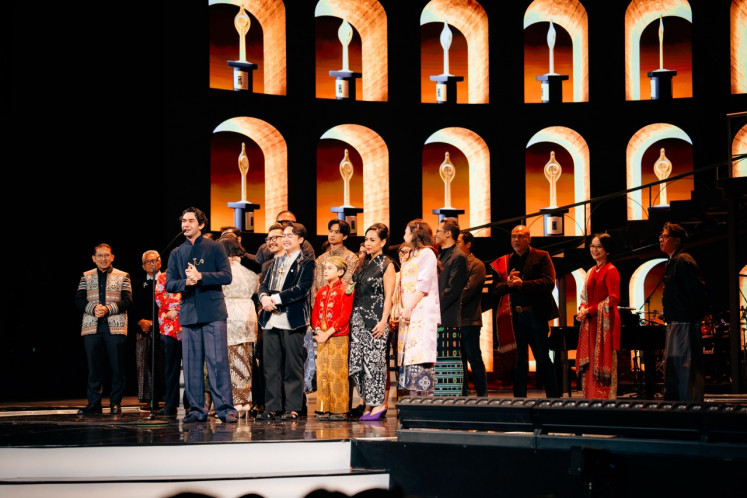Popular Reads
Top Results
Can't find what you're looking for?
View all search resultsPopular Reads
Top Results
Can't find what you're looking for?
View all search resultsEssay: English as a hybrid language
Singapore is the clearest example of how vibrant multilingual life is always maintained and preserved by its community.
Change text size
Gift Premium Articles
to Anyone
I
have of late participated in an international conference on discourse and community hosted by one the oldest universities in Kuala Lumpur, Malaysia. Elevating issues on how language, especially English, is used in the international community. The conference, regional in its scope, featured scholars from ASEAN countries.
What was particularly intellectually engaging was the panel discussion that centered on a timely, yet controversial topic: how the spread of the English language along with its local varieties (known as “Englishes”) in the world is seen as engendering linguistic injustice among non-native English speakers.
Scholars are now concerned over the privileged status given to Standard English, which has often been imposed as the only “correct” norm whenever one speaks and writes in the language. The vibrancy of multilingual life, they contend, is at stake if one language variety is often valorized and privileged, while others are demoted and deemed inferior in status.
Each panelist in the discussion shared their countries’ almost similar linguistic situations where Standard English is still the preferred option for communication. Yet, the scholars vividly illustrated through real language instances from their research data that their country’s insistence on pressing communities to privilege this variety at the expense of other living varieties is always met with resistance that can be covert and overt.
Singapore is the clearest example of how vibrant multilingual life is always maintained and preserved by its community. Despite its recent government policy to press people to adhere to Standard English as the country’s official language vis-à-vis Singaporean English (Singlish) as the unofficial one, linguistic resistance from the ground-up abounds.
Singlish, as a local vibrant English variety spoken by Singaporeans, has often been relegated in its status as an uneducated and polluted English variety, and a handicap and disservice to Singapore. Nevertheless, this variety thrives in its usage, as the people are proud of using it even in official discourse.
It should come as no surprise then that Singlish expressions such as “can can” (giving confirmation), “can lah” (yes) and “can hah?” (are you sure?) are a perfectly acceptable variety of Englishes in Singapore.
Going beyond a linguistic reason, the use of Singlish reflects the affirmation of identity of Singaporeans as multilingual speakers who have their own way of communicating using English.
Similarly, the Philippines is a highly multilingual country where the Standard English variety coexists with the local Englishes varieties. Like in other multilingual countries, one can find the prevailing linguistic injustice taking place in a more official setting like education, as has been the case where a student was expelled from a school and transferred to another school simply because he spoke his home language instead of English.
A recent study conducted by the Filipino panelist has shown that resistance to Standard English is most obvious in linguistic landscapes in Metro Manila and other locations where people deliberately and playfully mix English with local varieties to achieve a particular communicative purpose, as well as to boast their identities as Filipino.
Resistance to English in Indonesia, however, is not as overt as to that of the two countries above. This is perhaps because of the differing status of English in Indonesia, which is a foreign language. Thus, while no apparent local English varieties evolve here, Standard English is seemingly deemed a sacrosanct variety that must be conformed to, especially in official discourse like education. It is a norm-provider variety.
Yet despite this, ground up resistance, like in both the Philippines and Singapore, is also visible in public spaces such as signs, advertisements, billboards and graffiti mostly in urban areas in Indonesia. Different from examples in Singapore and the Philippines, such resistance is merely intended for the sake of captivating customers into buying certain commercial products, rather than to show off one’s identities as a multilingual speaker. Catchy branding playfully saturated with a mix of different linguistic codes certainly evokes positive sentiments to lure customers to buy products.
Resistance to the unbridled dominion of English in life’s domains in multilingual countries as an endeavor to uplift one’s multilingual identity should be critically understood as an act of decolonizing English, which is by itself a colonizing language. It is also an act of disentangling linguistic injustice amid the incessant promotion of English language ideology in almost all of life’s domains.
Such a decolonizing act is not without reason. The numbers of multilingual speakers who use English as either a second language or additional languages surpass those of native English speakers. In fact, as an infamous lingua franca, English has been transformed into a hybrid language, with no single nation or individual ever claiming the absolute rights to its ownership.
So understood, it is legitimate when a multilingual speaker exploits his wealth of linguistic repertoires, uses and mixes them with the Standard variety, eventually creating a new variety of Englishes that might be radically different from the established variety.
Besides, relying on a single standard variety of English denies the fact that multilingual speakers possess language resourcefulness that they can exploit at their disposal whenever they interact with other speakers from varied language backgrounds.
It is this language resourcefulness that we must cultivate and develop in our efforts to produce meanings through mix-linguistic practices in the multilingual context. For the sake of the pursuit of linguistic equality, this idea certainly goes to the very heart of language hegemony decolonization.
***
The writer teaches at the graduate school of Applied English Linguistics, School of Education and Language, Atma Jaya Catholic University, Jakarta. He can be reached at setiono.sugiharto@gmail.com











